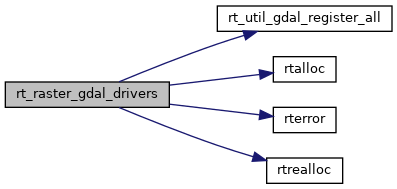◆ rt_raster_gdal_drivers()
| rt_gdaldriver rt_raster_gdal_drivers | ( | uint32_t * | drv_count, |
| uint8_t | can_write | ||
| ) |
Returns a set of available GDAL drivers.
- Parameters
-
drv_count : number of GDAL drivers available can_write : if non-zero, filter drivers to only those with support for CreateCopy and VirtualIO
- Returns
- set of "gdaldriver" values of available GDAL drivers
Definition at line 1716 of file rt_raster.c.
void rterror(const char *fmt,...) __attribute__((format(printf
Wrappers used for reporting errors and info.
int rt_util_gdal_register_all(int force_register_all)
Definition: rt_util.c:347
Definition: librtcore.h:2675
References rt_gdaldriver_t::can_read, rt_gdaldriver_t::can_write, genraster::count, rt_gdaldriver_t::create_options, rt_gdaldriver_t::idx, rt_gdaldriver_t::long_name, rt_util_gdal_register_all(), rtalloc(), rterror(), rtrealloc(), and rt_gdaldriver_t::short_name.
Referenced by RASTER_getGDALDrivers(), rtpg_assignHookGDALEnabledDrivers(), and test_gdal_drivers().
Here is the call graph for this function:

Here is the caller graph for this function:
